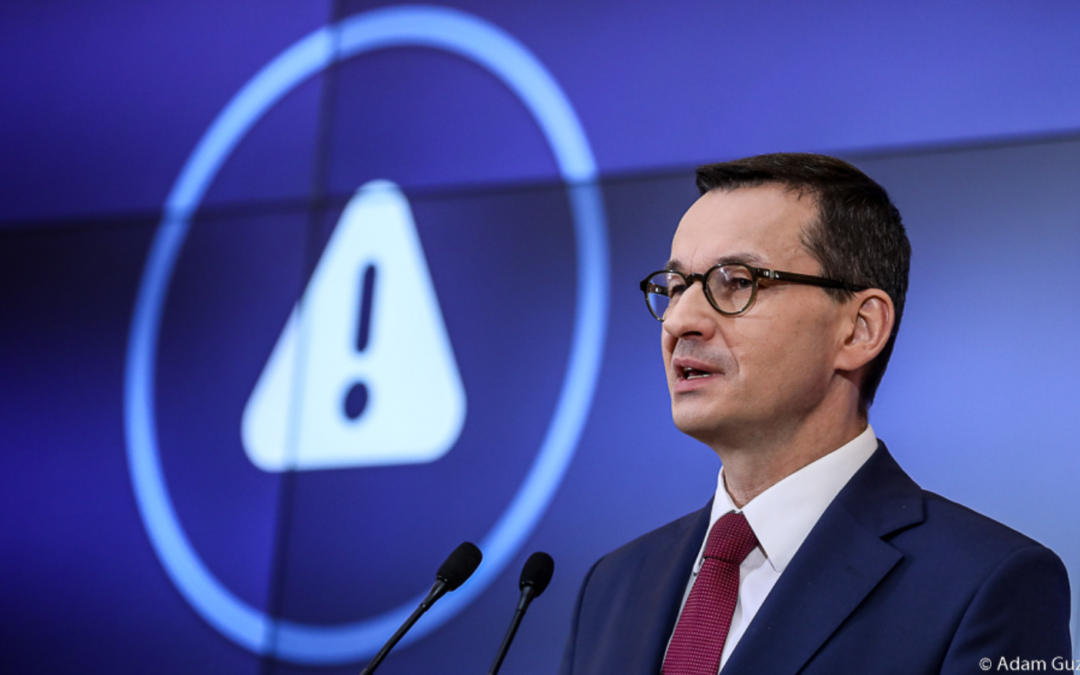Poland’s government has announced further restrictions in an effort to mitigate the spread of the coronavirus, including limits on people leaving their homes and public gatherings.
Prime Minister Mateusz Morawiecki, speaking alongside Health Minister Łukasz Szumowski, said that from tomorrow gatherings of more than two people will be prohibited (with an exception for families). Religious ceremonies, such as masses and funerals, are also limited to no more than five attendees.
People must not leave their homes except to go to a shop or pharmacy, to travel to work or for medical treatment, or to walk the dog or provide care for relatives. Those volunteering for work in the fight against the virus are also excepted.
Following some initial confusion as to whether leaving the house to exercise is also exempted, the health ministry later confirmed that it is. Activities such as jogging, cycling and walking are permitted as long as no more than two people participate together and they avoid other people.
New restrictions on the use of public transport will also be implemented, including allowing only half seats on buses, trams and metro trains to be occupied in order to limit contact between passengers.
The new restrictions will be in place until at least 11 April, and fines of up to 5,000 zloty can be issued for those who violate them. The army will assist the police in enforcement.
Wprowadzamy nowe zasady bezpieczeństwa w związku z #koronawirus❗️
?Czytaj więcej: https://t.co/UYc6Fmja3s pic.twitter.com/0FRU5eTFzd
— Kancelaria Premiera (@PremierRP) March 24, 2020
“All models show that we need to radically limit the possibility of person-to-person contact,” said Szumowski. “If we do not limit gatherings to zero, do not limit leaving the house practically to zero, we will not be able to save human lives.”
The health minister said he understood that “the effects of the lockdown will be felt by the entire economy”. But if it were not implemented, hundreds of thousands of people could fall ill and hundreds could die, he added.
“Any transgression of these restrictions can be fatally dangerous,” warned Morawiecki. “The restrictions are necessary to control the spread and prevent the situations we are seeing every day in Spain or France…We are making these decisions to buy time, to prepare hospitals.”
The prime minister also noted that the fact that the growth of confirmed coronavirus cases in Poland has been slower than expected should not be seen as a reason to relax restrictions. As of today, there have been 774 diagnosed infections in Poland, including nine deaths. The health minister had previously warned that by the end of this week the figure would exceed 1,000.
When asked whether the government would now be seeking to postpone presidential elections in May, as the opposition have demanded, the prime minister said that he saw “no reason” for doing so. He also said he expected school exams scheduled for May to go ahead.
Poland’s response to the coronavirus has been to introduce early and strict measures, first closing educational and cultural institutions and then suspending international air and rail connections as well as banning the entry of non-resident foreigners.
For all of our coverage of the emergency in Poland, see our constantly updated archive of stories here.
Main image credit: Kancelaria Premiera/Twitter

Daniel Tilles is editor-in-chief of Notes from Poland. He has written on Polish affairs for a wide range of publications, including Foreign Policy, POLITICO Europe, EUobserver and Dziennik Gazeta Prawna.




















